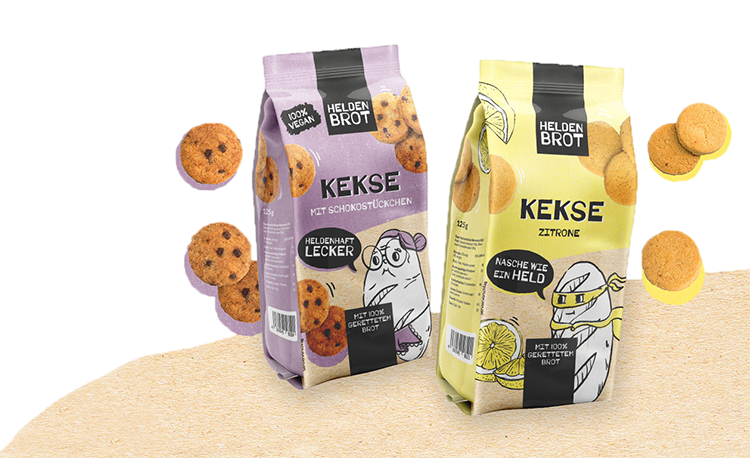
By Helga Baumfalk
The name is well chosen. ‘Heldenbrot’ (Hero Bread) is the label under which the start-up Kultimativ gives leftover bread a second chance by processing it into cookies or other products. And the consumer also feels good from being a ‘food savior’.
Janine Trappe and Felix Pfeffer founded their company based in Constance in 2017. Since then, they have been, in their own words on a ‘bread-saving mission’. Since then, 180,000 kg of leftover bread have been saved from destruction and instead turned into bread dumplings, noodles, bread crunchies, bread balls* and, more recently, cookies. ‘Food upcycling’ is the name they have given to what they do.

Felix Pfeffer and Janine Trappe, the founders and managing directors of Kultimativ, which produces Heldenbrot
Distribution is primarily done through the company’s own online store, but also through delis and food stores selling unpackaged items, grocery retailers and more than 150 bakery outlets. The cookies – chocolate and lemon – are made with breadcrumbs from rescued bread. “They give the cookies that special crunch and a slightly salty note that harmonizes with the typical sweetness of cookies,” explains Janine Trappe. Both varieties are listed with the German retail companies, Bünting and Rewe.
Selling upcycled food has to come with explanations. “Consumers still need to learn why food upcycling is good. And that it doesn’t mean sacrificing taste,” she says. Janine’s company and all of her other startup colleagues certainly have some educating to do. “When consumers think of rescued food, it’s not uncommon for them to have images in their heads of people digging through supermarket containers.” She is very aware of this. “That has nothing at all to do with what we do,“ Janine adds.
“Consumers still have to learn why food upcycling is good. And that it doesn’t mean sacrificing taste. ”
Janine Trappe, co-founder and managing director, Kultimativ
Cooperation with bakeries
Additional bread is supplied by bakeries in southern Germany, with which Heldenbrot has agreed partnerships. The bread comes from overproduction, is damaged goods with blemishes, and is largely returned to stores. Trappe: “We only use previously agreed types of bread with ingredient composition that matches our products. At present, it’s mainly light-colored bread types such as rolls, white bread or baguettes. Recently, we also integrated pretzel pastries.” Other bread varieties are to follow. Janine Trappe explains further, “We require specifications of the breads and conclude a supplier agreement with the bakers, in which it is regulated, among other things, that we only purchase saved bread and that the bakers cannot go into overproduction for us. We buy the bread from the bakers at a fair price per kilogram. Of course, it goes without saying that it must be perfectly hygienic and must not have left the food cycle.”
*Bread balls are offered as a dry mix that consumers can shape into a type of ‘patty’ by adding water and then frying.


